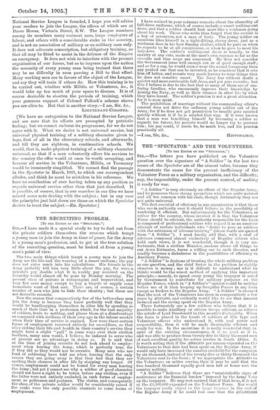{To THE EDITOR OF THE " SPECTATOR." . 1
Sin,—I have made it a special study to try to find out from the private soldiers themselves the reasons which tempt a young man to join the Army in time of peace, for the Army is a young man's profession, and, to get at the true solution of the recruiting question, must be looked at from a young man's point of view.
The two main things which tempt a young man to join the Army are the life and the wearing of a smart uniform; the pay does not enter much into his calculations. His friends in the Army probably tell him very little about the pay, for were a private's pay double what it is, weekly pay received on the Saturday would almost all be gone by Monday morning. The present class of private is extravagant and improvident, and very few save money except to buy a bicycle or supply some immediate want of that sort. There are, of course, a certain number of men who join to hide their identity ; but these are not desirable recruits.
Now the reason that comparatively few of the better-class men joiu the Army is because they know perfectly well that they would be handicapping themselves in after life by spending so much of their time in a profession which, for the vast majority of soldiers, leads to nothing, and places them at a disadvantage as compared with civilians of their own age in the labour market when their time of service is expired. Now were there certain forms of employment reserved entirely for ex-soldiers, so that after risking their life and health in their country's service they might have a slight "pull" in some ways over their civilian brothers, many men would, I believe, be induced to serve who at present see no advantage in doing so. It is said that at the time of joining recruits do not look ahead to employ- ment when leaving the Army, which is perfectly true, for if they did so they would not be recruits. Many men who are fond of soldiering have told me when leaving that the only reason they are going away is that they feel that they are spoiling their chances in after life by stopping any longer. Of course, employment could not be found for every man leaving the Army ; but yet I cannot see why a soldier of good character should not have a right to be taken before any civilian, even if the latter were not entirely excluded, in such forms of employ- ment as policemen and postmen. The status, and consequently the class, of the private soldier would be considerably raised if the ranks were the only possible channels to some forms of employment. I have noticed in your columns remarks about the absurdity of full-dress uniforms, which of course include a smart walking-out dress, and that a soldier should look more like a workman going about his work. Those who write thus forget that the recruit is a boy of seventeen, not a man of forty. The young soldier on occasions likes himself in a tight-fitting, showy dress, just as a workman does in his best Sunday clothes, which he puts on when he expects to be at all conspicuous, or when he goes to meet his lady-love. The soldier's walking-out dress is usually, in the cavalry at any rate, made at the man's own expense so far as the overalls and blue serge are concerned. He does not consider the Government issue well enough cut or of good enough stuff ; and as for a cap, he would sooner wear the round forage-cap than any peaked one that can be invented, as he considers that it sets him off better, and resents very much having to wear things that he does not consider smart. The Navy has without doubt a quieter and more serviceable full dress, and yet gets recruits ; but this I believe is due to the fact that so many of them are of sea- faring families, who enormously improve their knowledge by joining the Navy, as well as their chances in after life by what they have learnt. The soldier's pension is not a great attraction for it is soon spent.
The prohibition of marriage without the commanding officer's consent does not drive the ordinary young soldier out of the Army, for if he does not get permission he usually gets married quietly without it if he is minded that way. If it were known that a man was benefiting himself by becoming a soldier as regards his future, his parents would no longer try to prevent him ; his pay could, if needs be, be much less, and his pension practically nil.
—I am, Sir, &c., HIPPODAMOS.














































 Previous page
Previous page